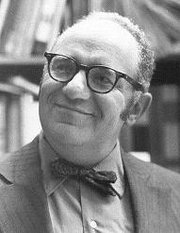
Murray Rothbard
"Mr. Libertarian" Murray Rothbard (1926 - 1995) was trained in mathematics and economics at Columbia University in New York. Through the Foundation for Economic Education, he met Austrian economist Ludwig von Mises, and was particularly influenced by Mises book Human Action, published in 1949. Rothbard, immersed in laissez faire economics, soon came to realize that the logic led inevitably to anarchism. Like Molinari, he reasoned that, if monopoly was bad for every other good or service, then it was bad for the provision of protection services, i.e. government. Rothbard published his comprehensive economic tome, Man, Economy, and State, in 1962.
Rothbard's anarchism, which he dubbed "anarcho-capitalism," took the anti-statism of the earlier American Individualist anarchists, but buttressed it with modern economics, thus eliminating its Achilles heel. No longer was scarcity wished away; no longer was money crankism to be part of anarchism. Austrian economic theory saw to that. No longer was the demagogic class warfare of greedy capitalists versus exploited poor used to bamboozle ignorant masses; if the notion of class was used at all, it was to denote producers versus parasites, with laborers and entrepreneurs and capitalists all part of the producing class. The parasites were the rulers, their flatterers and agents, and the corporations and special interests who bought favors.
On the free market, everyone earns according to his productive value in satisfying consumer desires. Under statist distribution, everyone earns in proportion to the amount he can plunder from the producers. - Murray N. Rothbard, Man, Economy, and State
Rothbard's definition of state was a combination of Weber's and Oppenheimer's. The state was a geographic monopoly of force, but also the organization of legalized plunder.
Briefly, the State is that organization in society which attempts to maintain a monopoly of the use of force and violence in a given territorial area; in particular, it is the only organization in society that obtains its revenue not by voluntary contribution or payment for services rendered but by coercion.
|
